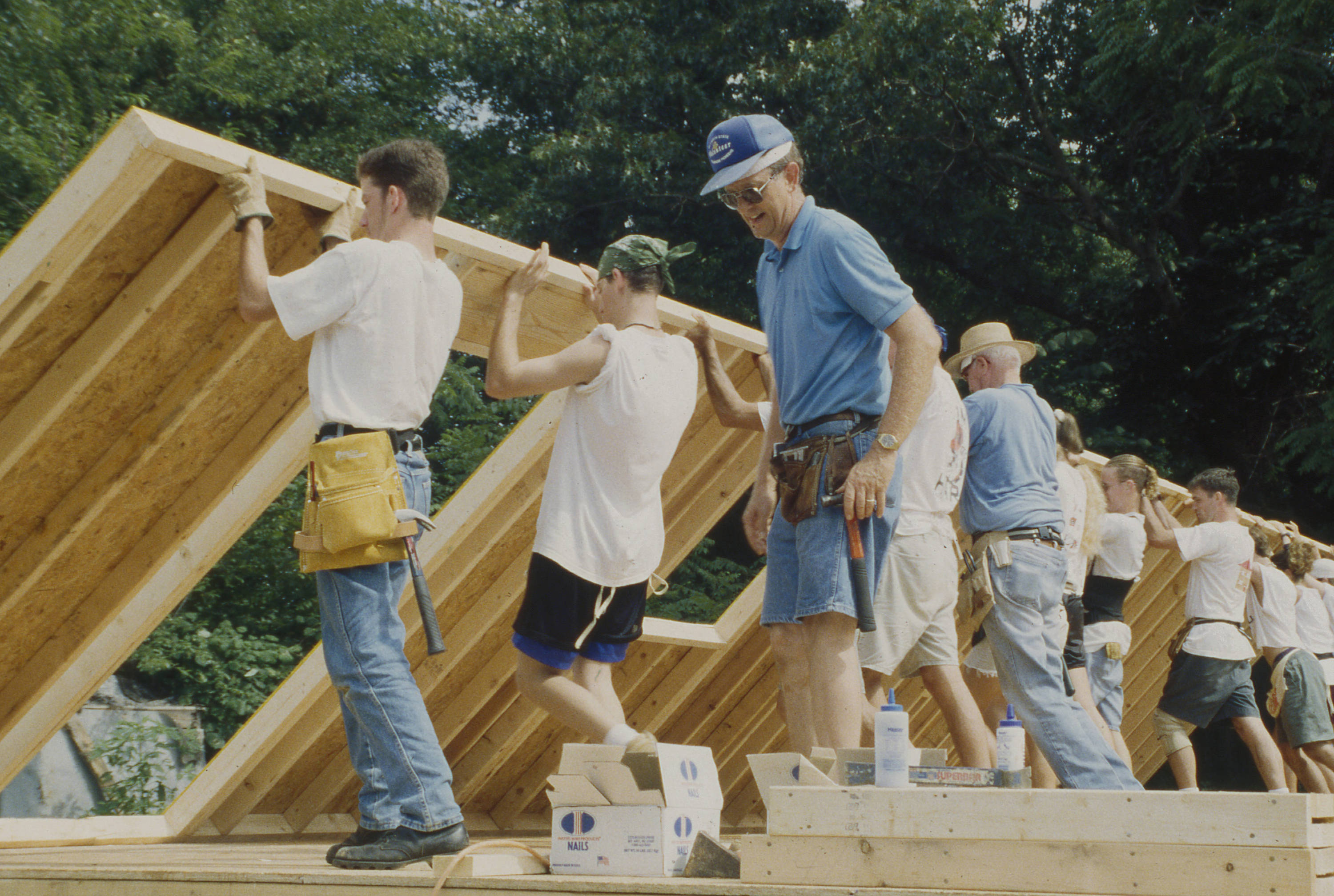In this edition of #ElonTBT, we celebrate a history of service at the university, specifically its efforts to charter one of the nation's first campus chapters of Habitat for Humanity.
In the #ElonTBT series, the Elon University News Bureau, along with Archives & Special Collections, will flash back to the past to take a look at Elon over the years. You will find videos, newspaper clippings, photos and more to celebrate Elon’s past, while looking ahead to the future. Follow along on Today at Elon and the university’s Twitter, Facebook and Instagram pages every Thursday to see what we dig up.
The Elon Habitat for Humanity chapter offers students the opportunity to support surrounding communities by building homes for neighbors who need them – it’s a mission that started more than 30 years ago and has even garnered attention from a former U.S. President.
On Sept. 8, 1988, Elon chartered what was only the 30th campus chapter of Habitat for Humanity in the country. The new chapter was established less than a year after the country’s first campus chapter launched at Baylor University.
Elon’s chapter completed its first major project in 1989, working with the Alamance County Habitat chapter to completely renovate a house in Burlington. Two years later, the chapter would construct its first new home in the spring and fall of 1991 across from the Elon Fire Station. But that was only the beginning of the chapter’s impact on campus and in the community.
To supplement university funding, the chapter began hosting yard sales, dinners, concerts and other events to raise money for building materials and future projects. Members also asked Elon students, faculty and staff to donate $20, which was about the cost of building one square foot of a house, to join the “Square-Foot Club” and help the organization continue to build houses in the community.

Since its beginning, Elon Habitat has constructed nearly 30 houses in Alamance County. Elon’s Habitat for Humanity chapter completed its first full project on Feb. 4, 1990, when it dedicated a house on Seventh Avenue in Burlington to a local family. Cathy Delk and her family were recipients of the home, which was the family’s first.
“There are so many bad things about the world and the people in it,” Delk told The Pendulum in the April 12, 1990, edition of the student newspaper. “And then when you experience something like this, it just shows you that there’s just a whole, whole lot of people in this world that are good people.”
Tracy Pilc, who was a first-year student and Elon Habitat volunteer working on the project, told the newspaper, “the best part about working with Habitat is the relationships you form. It’s a good cause. You can make a difference … I get a lot out of it personally, knowing that I’m helping someone else.”
In the fall of 1995, Elon Habitat took a major step forward as it became the nation’s first campus chapter to commit to building one Habitat home each academic year.
The organization’s passion and commitment throughout its existence have brought recognition from national figures. Habitat for Humanity founder Millard Fuller has twice visited campus. And, in 1989, members of Habitat Elon had the opportunity to meet a former U.S. president.

Before delivering Elon’s Centennial Convocation address, former President Jimmy Carter promoted the merits of Habitat for Humanity and visited with Elon students at a Habitat home they built in Elon. He later gave the keynote address during Elon’s three-day symposium titled “Reaffirming a Tradition of Service.”
During his visit, Carter said Habitat for Humanity “gives people the opportunity to work with people from all aspects of life,” according to the April 27, 1989, edition of The Pendulum. In his convocation address, Carter also urged students to give back to the communities that gave so much to them.

That commitment to service has continued to live on at Elon. In 1990, Elon Habitat began the campus’ practice of performing service projects during fall break, winter term and spring break, when students traveled to South Carolina with Chaplain Emeritus Richard McBride to assist in rebuilding projects following Hurricane Hugo. The first Elon Habitat study abroad experience took students to Guatemala the following year. The “Alternative Break” tradition continues today.
Elon Habitat eventually became the largest student organization on campus and expanded to become Elon Volunteers!, the campus volunteer organization that provides all members of the Elon community the opportunity to engage in community service.
For more information about getting involved in service projects at Elon, visit the Elon Volunteers! website, and to learn more about Elon’s Habitat for Humanity chapter, email habitat@elon.edu or click here.
Do you have any special pieces of Elon history? Share your photos and videos with us via email at news@elon.edu or using the hashtag #ElonTBT on Twitter, Facebook and Instagram.



